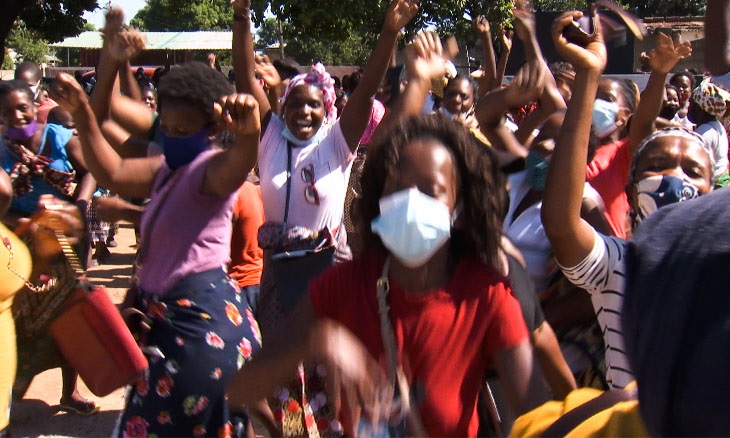Mozambique: More than 60,000 face water access crisis in Marrupa - RM
Protests over lists of Covid-19 subsidy beneficiaries

Photo: O País
Families in the Dlhavela neighbourhood in Matola complain that they are being unfairly excluded from government subsidies to mitigate the effects of Covid-19. Last Monday, a demonstration near the ‘Círculo’ demanding explanations from neighbourhood authorities descended into vandalism.
Early in the morning, a group of mostly women gathered next to the neighbourhood headquarters to demand an explanation for alleged discrimination in the allocation of subsidies.
In the confusion, Covid-19 preventive measures took a back seat.
“I want my money. I’m from Block 10. Now, I’m not going to the machamba. They forbade us to go to the machamba because of the coronavirus, but that money – we don’t see it. Some received this money, and we don’t know what the criteria were,” said Helena, an elderly neighbourhood resident.
Also read: Maputo: Residents in Inhagóia B protest against exclusion from Covid-19 subsidies
Feelings ran so high that some residents smashed windows and forcibly pulled on the door of the premises, driving out the highest neighbourhood authority figure.
While some wanted money, others joined the demonstration in support of their neighbours.
Such is the case of Flávia Manjate. “I’m here because there is injustice in this process. I know three families of widowed people who are destitute, but they were left out,” she said, a baby in her arms. “I am aware that I am putting my son at risk, but it is about an injustice that I cannot fail to protest against,” she said when asked if she didn’t think her baby son might catch the coronavirus.
At the time, feelings were so strong that the neighbourhood structures demanded the block chief make a list of those present. This was done, although it was not altogether obvious what for.
From the authorities’ point of view, these problems are a result of a lack of information about eligibility for the grants. ‘O País’ contacted Matola municipality, the district administrator and the National Institute of Social Action (INAS) delegation, but all referred the paper to central INAS.
Our reporter went to that institution, but was unable to interview the managers in question.
However, according to a document which the ‘O País’ accessed at INAS, assistance to families within the scope of Covid-19 is part of a plan budgeted at US$240 million (13.7 billion meticais).
This plan was prepared by the Ministry of Gender, Children and Social Action and is being implemented by the INAS in collaboration with local administrative teams.
According to the document, “people permanently incapacitated and capacitated to work [who are] in situations of poverty and vulnerability without a source of income in the areas of focus indicated by the Ministry of Economy and Finance” are eligible for subsidies from the fund.
Priority groups include “households headed by elderly people; households headed by people with chronic and degenerative diseases; households headed by people with disabilities; households headed by children; households with children and/or living with elderly people, people with disabilities and people with chronic degenerative diseases; households headed by pregnant women without a source of income; and households headed by women living with six or more dependents”.
Persina Ezequiel, a widow also living in Dlhavela neighbourhood, who takes care of seven children, one of them with special needs, claims she falls within the last category, but says she is still excluded.
“I have no way of going to work with a child like that. Even if someone comes with a job offer, I’m afraid to leave it here, because the other children are also minors. She does not eat like other children. She needs light food, because her jaw is stuck. I have been to several centres, but there is no one to help me. I’m suffering,” she complains, lapsing into tears.
By Raúl Massingue













Leave a Reply
Be the First to Comment!
You must be logged in to post a comment.
You must be logged in to post a comment.